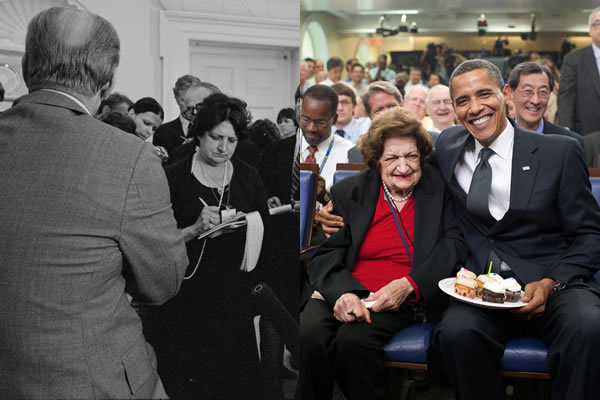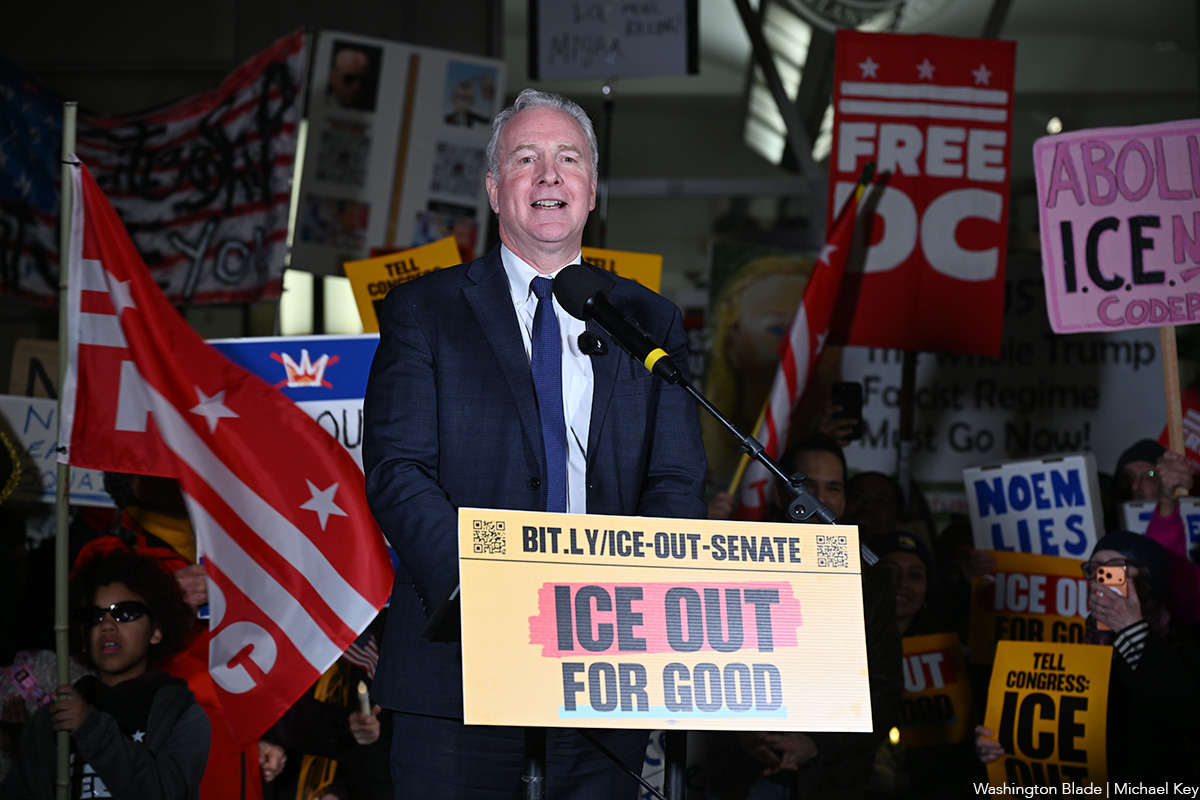Politics
A White House reporter’s reflections on Helen Thomas
Pioneering work helped open doors for many others in press corps


Helen Thomas as a member of the White House Press Corps — past and more recent. (Photo of Helen Thomas with President Gerald Ford by Marion S. Trikosk; Photo of Helen Thomas with President Barack Obama by Pete Souza).
The news of Helen Thomas’s death on Saturday morning jolted me. It wasn’t surprising in one sense, because she was 92 years old, but it made me pause to reflect on my own presence in the White House press corps and how she opened the door for so many reporters, including me.
I first saw Helen Thomas in the White House briefing room when I started attending daily briefings at the start of the Obama administration, working the beat for federal LGBT politics. Blade reporters had been kicked out of the briefing room during George W. Bush’s second term, so it was a new era and an exciting time.
I remember thinking Thomas could move around the press area deftly for a woman in her late 80s and could hold her own in conversations with other reporters. During a news conference with President Obama in the East Room, she had to have someone escort her by hand over the wires and between the chairs, but otherwise she seemed full of energy.
Bestowed with a front row seat in the briefing room by her colleagues, Thomas would pester then-White House Press Secretary Robert Gibbs with questions that would probably veer a little too close toward editorializing than other reporters in the briefing room would be comfortable asking.
One such instance occurred in October 2009 when Thomas asked Gibbs if the administration had given up on including a government-run public option as part of health care reform. Gibbs replied, somewhat light-heartedly to the octogenarian reporter, that he had answered the question several times before.
“I apparently don’t answer it to your satisfaction,” Gibbs said. “I’ll give you the same answer that I gave you unsatisfactorily for many of those other days.”
When Gibbs said the administration would work to include choice and competition in health care reform, Thomas vocally surmised, “You’re not going to get it.” And when Gibbs responded with his own question about why Thomas kept asking, she responded, in an almost grandmotherly way, “Because I want your conscience to bother you.”
But Thomas was holding the White House accountable long before the Obama administration. Getting her start in the Kennedy administration, Thomas broke up the boys’ club that was the White House Press Corps and was the first female reporter to cover the president, rather than the first lady.
In 1962, she pressed Kennedy to skip the annual dinner of the White House Correspondents Association unless it were open to women. After he said he wouldn’t attend, the dinner for the first time admitted women.
One of my major regrets is that I never initiated a conversation with Thomas during the times I saw her in the White House briefing room or the press area. Our time that coincided covering the White House in 2009 was very short. Also, I was little intimidated as I was still getting my bearings. Lesson to all: If you see someone you admire, take the opportunity to speak to them before it’s too late.
It’s unfortunate that her White House career came to a somewhat ignominious end.
In 2010, when Thomas was questioned on Jewish Heritage Celebration Day by a reporter about her thoughts on Israel, she replied, “Tell them to get the hell out of Palestine.” Asked where Israeli Jews should go, Thomas offered that Poland, Germany or the United States would be good options instead of Israel, adding “Why push people out of there who have lived there for centuries?” As a controversy unfolded and supporters of Israel grew angry, Thomas submitted her resignation to Hearst Newspapers.
I remember Gibbs responded to the controversy in a much more grave tone than the manner in which he addressed her questions about the public option. He took the liberty of not just speaking for the White House, but for the press corps.
“Those remarks were offensive and reprehensible,” Gibbs said. “I think she should, and has, apologized because, obviously those remarks do not reflect certainly the opinion of, I assume, most of the people in here .. and certainly not the administration.”
Still, the way in which Thomas’s role as a White House reporter ended was a small part of her half-century career. As President Obama noted in his statement upon her death, Thomas was a “true pioneer, opening doors and breaking down barriers” for women in journalism.
And her courage opened for the door for me as well. The way Thomas broke down barriers and made sure women had a place in the White House press corps — as well as the continued tenaciousness of her questioning over the decades — made it easier for me to work as an openly gay reporter in the White House briefing room representing an LGBT publication.
I would never compare my work to Thomas’s, but the way she shook things up started a process that allowed me decades later to come to the briefings and — regardless of the news of the day occupying mainstream reporters — ask questions about “Don’t Ask, Don’t Tell” repeal, the president’s evolution on marriage equality, and why the administration continues to withhold an executive order protecting LGBT workers.
Thanks to Thomas, if White House officials aren’t doing enough to advance LGBT rights, we can make sure their consciences will bother them.
Congress
McBride, other US lawmakers travel to Denmark
Trump’s demand for Greenland’s annexation overshadowed trip

Delaware Congresswoman Sarah McBride is among the 11 members of Congress who traveled to Denmark over the past weekend amid President Donald Trump’s continued calls for the U.S. to take control of Greenland.
McBride, the first openly transgender person elected to Congress, traveled to Copenhagen, the Danish capital, with U.S. Sens. Chris Coons (D-Del.), Thom Tillis (R-N.C.), Jeanne Shaheen (D-N.H.), Dick Durbin (D-Ill.), and Lisa Murkowski (R-Alaska) and U.S. Reps. Steny Hoyer (D-Md.), Gregory Meeks (D-N.Y.), Madeleine Dean (D-Pa.), Don Bacon (R-Neb.), and Sarah Jacobs (D-Calif.). The lawmakers met with Danish Prime Minister Mette Frederiksen and Greenlandic MP Pipaluk Lynge, among others.
“I’m grateful to Sen. Coons for his leadership in bringing together a bipartisan, bicameral delegation to reaffirm our support in Congress for our NATO ally, Denmark,” said McBride in a press release that detailed the trip. “Delaware understands that our security and prosperity depend on strong partnerships rooted in mutual respect, sovereignty, and self-determination. At a time of growing global instability, this trip could not be more poignant.”
Greenland is a self-governing territory of Denmark with a population of less than 60,000 people. Trump maintains the U.S. needs to control the mineral-rich island in the Arctic Ocean between Europe and North America because of national security.
The Associated Press notes thousands of people on Saturday in Nuuk, the Greenlandic capital, protested against Trump. British Prime Minister Keir Starmer is among those who have criticized Trump over his suggestion the U.S. would impose tariffs against countries that do not support U.S. annexation of Greenland.
A poll that Sermitsiaq, a Greenlandic newspaper, and Berlingske, a Danish newspaper, commissioned last January indicates 85 percent do not want Greenland to become part of the U.S. The pro-independence Demokraatit party won parliamentary elections that took place on March 12, 2025.
“At this critical juncture for our countries, our message was clear as members of Congress: we value the U.S.-Denmark partnership, the NATO alliance, and the right of Greenlanders to self-determination,” said McBride on Sunday in a Facebook post that contained pictures of her and her fellow lawmakers meeting with their Danish and Greenlandic counterparts.
Congress
Van Hollen speaks at ‘ICE Out for Good’ protest in D.C.
ICE agent killed Renee Nicole Good in Minneapolis on Jan. 7

U.S. Sen. Chris Van Hollen (D-Md.) is among those who spoke at an “ICE Out for Good” protest that took place outside U.S. Customs and Border Protection’s headquarters in D.C. on Tuesday.
The protest took place six days after a U.S. Immigration and Customs Enforcement agent shot and killed Renee Nicole Good, a 37-year-old woman in Minneapolis.
Good left behind her wife and three children.
(Video by Michael K. Lavers)
Congress
Advocates say MTG bill threatens trans youth, families, and doctors
The “Protect Children’s Innocence” Act passed in the House

Georgia Congresswoman Marjorie Taylor Greene has a long history of targeting the transgender community as part of her political agenda. Now, after announcing her resignation from the U.S. House of Representatives, attempting to take away trans rights may be the last thing she does in her official capacity.
The proposed legislation, dubbed “Protect Children’s Innocence Act” is among the most extreme anti-trans measures to move through Congress. It would put doctors in jail for up to 10 years if they provide gender-affirming care to minors — including prescribing hormone replacement therapy to adolescents or puberty blockers to younger children. The bill also aims to halt gender-affirming surgeries for minors, though those procedures are rare.
Greene herself described the bill on X, saying if passed, “it would make it a Class C felony to trans a child under 18.”
According to KFF, a nonpartisan source for health policy research, polling, and journalism, 27 states have enacted policies limiting youth access to gender-affirming care. Roughly half of all trans youth ages 13–17 live in a state with such restrictions, and 24 states impose professional or legal penalties on health care practitioners who provide that care.
Greene has repeatedly introduced the bill since 2021, the year she entered Congress, but it failed to advance. Now, in exchange for her support for the National Defense Authorization Act, the legislation reached the House floor for the first time.
According to the 19th, U.S. Rep. Sarah McBride (D-Del.), the first trans member of Congress, rebuked Republicans on the Capitol steps Wednesday for advancing anti-trans legislation while allowing Affordable Care Act tax credits to expire — a move expected to raise health care costs for millions of Americans.
“They would rather have us focus in and debate a misunderstood and vulnerable one percent of the population, instead of focusing in on the fact that they are raiding everyone’s health care,” McBride said. “They are obsessed with trans people … they are consumed with this.”
Polling suggests the public largely opposes criminalizing gender-affirming care.
A recent survey by the Human Rights Campaign and Global Strategy Group found that 73 percent of voters in U.S. House battleground districts oppose laws that would jail doctors or parents for providing transition-related care. Additionally, 77 percent oppose forcing trans people off medically recommended medication. Nearly seven in 10 Americans said politicians are not informed enough to make decisions about medical care for trans youth.
The bill passed the House and now heads to the U.S. Senate for further consideration.
According to reporting by Erin Reed of Erin In The Morning, three Democrats — U.S. Reps. Henry Cuellar and Vicente Gonzalez of Texas and Don Davis of North Carolina — crossed party lines to vote in favor of the felony ban, joining 213 Republicans. A total of 207 Democrats voted against the bill, while three lawmakers from both parties abstained.
Advocates and lawmakers warned the bill is dangerous and unprecedented during a multi-organizational press call Tuesday. Leaders from the Human Rights Campaign and the Trevor Project joined U.S. Rep. Becca Balint (D-Vt.), Dr. Kenneth Haller, and parents of trans youth to discuss the potential impact of restrictive policies like Greene’s — particularly in contrast to President Donald Trump’s leniency toward certain criminals, with more than 1,500 pardons issued this year.
“Our MAGA GOP government has pardoned drug traffickers. They’ve pardoned people who tried to overthrow the government on January 6, but now they want to put pediatricians and parents into a jail cell for caring for their kids,” said Human Rights Campaign President Kelley Robinson. “No one asked for Marjorie Taylor Greene or Dan Crenshaw or any politician to be in their doctor’s office, and they should mind their own business.”
Balint, co-chair of the Congressional Equality Caucus, questioned why medical decisions are being made by lawmakers with no clinical expertise.
“Parents and doctors already have to worry about state laws banning care for their kids, and this bill would introduce the risk of federal criminal prosecution,” Balint said. “We’re talking about jail time. We’re talking about locking people up for basic medical care, care that is evidence-based, age-appropriate and life-saving.”
“These are decisions that should be made by doctors and parents and those kids that need this gender-affirming care, not certainly by Marjorie Taylor Greene.”
Haller, an emeritus professor of pediatrics at St. Louis University School of Medicine, described the legislation as rooted in ideology rather than medicine.
“It is not science, it is just blind ideology,” Haller said.
“The doctor tells you that as parents, as well as the doctor themselves, could be convicted of a felony and be sentenced up to 10 years in prison just for pursuing a course of action that will give your child their only chance for a happy and healthy future,” he added. “It is not in the state’s best interests, and certainly not in the interests of us, the citizens of this country, to interfere with medical decisions that people make about their own bodies and their own lives.”
Haller’s sentiment is echoed by doctors across the country.
The American Medical Association, the nation’s largest organization that represents doctors across the country in various parts of medicine has a longstanding support for gender-affirming care.
“The AMA supports public and private health insurance coverage for treatment of gender dysphoria and opposes the denial of health insurance based on sexual orientation or gender identity,” their website reads.
Rodrigo Heng-Lehtinen, senior vice president of public engagement campaigns at the Trevor Project, agreed.
“In Marjorie Taylor Greene’s bill [it] even goes so far as to criminalize and throw a parent in jail for this,” Heng-Lehtinen said. “Medical decisions should be between patients, families, and their doctors.”
Rachel Gonzalez, a parent of a transgender teen and LGBTQ advocate, said the bill would harm families trying to act in their children’s best interests.
“No politician should be in any doctor’s office or in our living room making private health care decisions — especially not Marjorie Taylor Greene,” Gonzalez said. “My daughter and no trans youth should ever be used as a political pawn.”
Other LGBTQ rights activists also condemned the legislation.
Tyler Hack, executive director of the Christopher Street Project, called the bill “an abominable attack on the transgender community.”
“Marjorie Taylor Greene’s last-ditch effort to bring her 3-times failed bill to a vote is an abominable attack on the transgender community and further cements a Congressional career defined by hate and bigotry,” they said. “We are counting down the days until she’s off Capitol Hill — but as the bill goes to the floor this week, our leaders must stand up one last time to her BS and protect the safety of queer kids and medical providers. Full stop.”
Hack added that “healthcare is a right, not a privilege” in the U.S., and this attack on trans healthcare is an attack on queer rights altogether.
“Marjorie Taylor Greene has no place in deciding what care is necessary,” Hack added. “This is another attempt to legislate trans and queer people out of existence while peddling an agenda rooted in pseudoscience and extremism.”
U.S. Rep. Mark Takano (D-Calif.), chair of the Congressional Equality Caucus, also denounced the legislation.
“This bill is the most extreme anti-transgender legislation to ever pass through the House of Representatives and a direct attack on the rights of parents to work with their children and their doctors to provide them with the medical care they need,” Takano said. “This bill is beyond cruel and its passage will forever be a stain on the institution of the United States Congress.”
The bill is unlikely to advance in the Senate, where it would need 60 votes to pass.


















